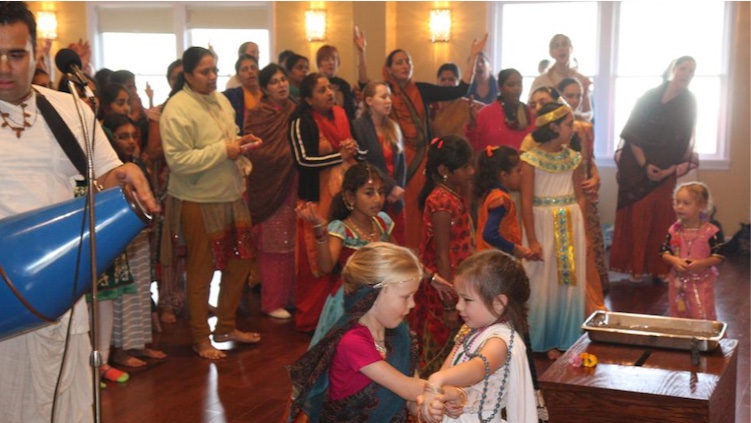Could ISKCON Portland Kick Off a Society-Wide Change of Sunday Feast Times?
By Madhava Smullen | May 28, 2015

In a move that could change ISKCON’s community development, social life and outreach if other centers follow suit, ISKCON of Portland, Oregon has shifted its Sunday Feast from its traditional late afternoon time and added a whole raft of activities to cater to families.
The Sunday Feast is, of course, ISKCON’s trademark weekly gathering that gives guests and devotees the experience of kirtan, sanctified food, Krishna conscious philosophy and association with like-minded spiritual people.
Like most of the society’s centers, the ISKCON temple in the Portland suburb of Hillsboro used to hold its Sunday Feasts later in the day – from 5pm until 8:30pm or later. And then there still had to be cleanup.
The schedule just didn’t work for the ISKCON Portland community, which consists almost entirely of families – like many ISKCON communities today.
“Dinner was not at a normal time for anyone,” says Vaishnava youth leader Lila Manjari Dasi. “Nobody eats dinner at eight o’clock at night! And it upset the night routine of our children, who had school the next day. What’s more, here in the Pacific Northwest, there’s a lot of rain, the roads can get icy, and people would often be driving back in the dark. So there was a safety concern too.”

A packed Sunday Feast at ISKCON Portland
The schedule also affected outreach. “In Western culture, you attend church in the morning,” Lila Manjari says. “We were trying to present to the general public a philosophy of goodness, but we were bringing people in in the evening, keeping them up late, and not feeding them until late. It just didn’t gel.”
Temple authorities and community members met and in August 2014 decided to drastically change the schedule to begin at eleven o’clock in the morning.
The response since has been positive and the benefits numerous – people with families can help clean up after the feast if they want to; everyone can eat at a reasonable time; there’s no safety concern getting back home; and children can get to bed on time.
“The other thing is that it’s allowed this terrific time spot after the Sunday Feast for people who are interested in increasing their spiritual knowledge and skills,” adds Lila-Manjari.
Here’s how it works. There’s a “warm-up” kirtan at 11:00am, followed by a Bhagavad-gita class at 11:30am.

Sri Sri Nitai Sacinandana at ISKCON Portland
During the class, children under the age of four currently sit with their parents (Although work is underway on a nursery where they’ll be able to play while their parents listen to the class through a speaker system).
Simultaneously while the class is running, three age groups of children attend Sunday School in three separate classrooms. The youngest children are currently studying the ten incarnations of Lord Krishna, the middle children the nine processes of devotional service, and the older children Vaishnava behavior. Each age group’s curriculum lasts for three years, then the children move up to the next age level.
Every three months, the children make a presentation on what they’ve been learning in place of the adult’s Bhagavad-gita class. On that Sunday Feast day, they also lead other elements of the program such as the kirtans.
After the Bhagavad-gita class and Sunday Schools, the second kirtan of the day is held at 12:30pm. This is followed by the Sunday Feast at 1:00pm.
At 2:00pm, there are kirtan and sloka (scriptural verse) classes for both adults and children who are interested. Meanwhile adults and children alike can socialize and build friendships – there’s even a playground for the children – and still leave by 4 o’clock in the afternoon.

Children excited about their costume contest
“When the program is late, you have to decide, ‘Am I going to fulfill my need for socializing, and neglect the kirtan or the class?’” says Lila Manjari. “But with this type of schedule, you can be fully present for all portions of the program, and still have time to develop Vaishnava relationships. Then you can go home and have the remainder of the day to get yourself and your family ready for Monday’s work and school.”
Lila Manjari feels that the new schedule shows appreciation for community members and guests by valuing the Sunday evening time that is important for families to prepare for the work week.
“We would love to share our schedule, and I would love to see this and its benefits spread across our movement,” she says. “I realize it’s a big change, and nobody likes change — we like what’s comfortable and familiar. But if communities are willing to give this a try, there’s no doubt in my mind that the positive aspects and benefits will quickly become apparent. It’s just been such a healthy change for our community.”
* * *
For more information on the Sunday schedule and Sunday School at ISKCON Portland, please visit iskconportland.com.















